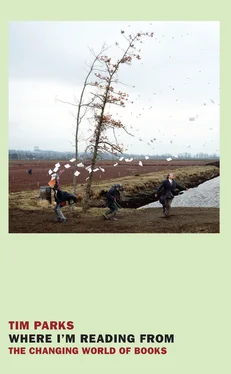With Leopardi, there are no problems of this kind. Nor does he have the sort of reputation that might prompt a translator to work toward a text that people are expecting. Although Italians consider him one of their greatest writers, Leopardi is hardly known in the Anglo-Saxon world, apart from his poetry (Jonathan Galassi published a translation of Leopardi’s complete poetic works as recently as 2011). However, even in Italy there is a staunch resistance to his prose work and philosophical thinking. It is not merely because he is ferociously anticlerical that so many “polite” thinkers shy away, or seek to disqualify him—Mazzini and Garibaldi were if possible even more so, but remain popular for their political positivism. There is also his absolutely lucid and quite remorseless pessimism. Here he is, in a fairly light moment, talking about universal envy:
The sight of a happy man, full of some good luck he’s had, or even just moderately cheered by it, some promotion won or favor granted, etc., is almost always extremely irksome not just to people who are upset or depressed, or simply not prone to joyfulness, whether out of choice or habit, but even to people neither happy nor sad and not at all harmed or deflated by this success. Even when it comes to friends and close relatives it’s the same. So that the man who has reason to be happy will either have to hide his pleasure, or be casual and amusing about it, as if it hardly mattered, otherwise his presence and conversation will prove hateful and tiresome, even to people who ought to be happy about his good luck or who have no reason at all to be upset by it. This is what thoughtful, well-educated people do, people who know how to control themselves. What can all this mean but that our self-regard inevitably and without our noticing leads us to hate our fellow man? There’s no doubt that in situations like this, even the nicest people with nothing at all to gain or lose from another’s success, will need to get a grip on themselves and show a certain heroism to join in the partying, or merely not to feel depressed by it.
How does this cosmic pessimism, as it’s sometimes called, affect my translation? As one reads the Zibaldone , one can’t help feeling that one has heard its voice elsewhere. Either Leopardi has had more influence than I knew about, or others since have arrived at similar combinations of gloomy content and emphatic style. An Italian can’t help thinking of Giorgio Manganelli and Carlo Emilio Gadda. But the voices that for me are most constantly present, or nascent, in long sections of the Zibaldone , are Samuel Beckett’s (the novels), Emil Cioran’s, and, above all—indeed overwhelmingly, especially in the wilder riffs on the scandals of human behavior—Thomas Bernhard’s. This is Bernhard’s character Reger in Old Masters reflecting on the value of painting:
Art altogether is nothing but a survival skill, we should never lose sight of this fact, it is, time and again, just an attempt — an attempt that seems touching even to our intellect — to cope with this world and its revolting aspects, which, as we know, is invariably possible only by resorting to lies and falsehoods, to hypocrisy and self-deception, Reger said. These pictures are full of lies and falsehoods and full of hypocrisy and self-deception, there is nothing else in them if we disregard their often inspired artistry. All these pictures, moreover, are an expression of man’s absolute helplessness in coping with himself and with what surrounds him all his life. That is what all these pictures express, this helplessness which, on the one hand, embarrasses the intellect and, on the other hand, bewilders the same intellect and moves it to tears, Reger said.
So, how far should I allow this perception of affinity to influence the way I translate? Can I prevent it? Am I just reading Bernhard back into Leopardi, or is the style, the attitude, really there in the Zibaldone ? I’m sure it is. Beckett certainly had read Leopardi, as had Cioran, but Bernhard? Bernhard was influenced by Beckett, occasionally to the point of plagiarism, and by Cioran of course. And he would have read Schopenhauer, who felt a great affinity for Leopardi, though Schopenhauer couldn’t have read the Zibaldone itself, since it wasn’t published until long after his death. Still, the more I think about it the less it matters whether Bernhard had actually read Leopardi or not. What is at stake here is the way a certain optimistic Christian socialism that has dominated in the West, an attitude that relies heavily on denial—benign denial, one might call it—has naturally spawned its opposite in writers whose fierce rhetoric determinedly exposes every illusion.
If, as a translator, I focus entirely on the semantics and the order in which Leopardi’s sentences are set up—something that the translators of the complete Zibaldone , shortly to be published by Farrar, Straus and Giroux, have tended to do, in understandable respect of the rigor of the writer’s thought—then that rhythm of scandal that I am hearing in his prose, the need to insist, against the grain of all conformity, that things really are as bad as they can be, the world a “solid nothing” and man, particularly modern man, “utterly beyond all hope”—will largely be lost. Because an insistent rhythm in English is not created the same way as it is in Italian, and because Leopardi’s sentences have such a determined flow, pushing forward impatiently, but remorselessly, with frequent repetitions and redundancies and constant lists that suddenly break off in edgy etceteras (my Word software counts 8,738 of them in the Zibaldone ). Here he is talking about the near impossibility of sincere friendship between those of the same profession:
For example, accepted that perfect friendship, abstractly considered, is impossible and contradictory to human nature, between peers even ordinary friendship becomes extremely difficult, rare and inconstant, etc. Schiller, a man of great feeling, was hostile to Goethe (since not only are people of the same profession not friends with each other, or less friendly, but there is actually more hatred between them than between others who are not in the same circumstances) etc. etc. etc.
As I see it, there would be little point in getting the semantics absolutely right, and even readable, if one failed to convey this emotive, Bernhardesque urgency; for, crucially, the emphatic rhythm—the hyperbole and insistence with which the pessimism is delivered—both increases its impact, and becomes its consolation, almost its comedy. Leopardi is not unaware of the perverse pleasure one can take in having demonstrated how bad things are. One of the passages that most gets me thinking of Bernhard, and resisting him, begins with a quote from the Aeneid where Virgil has Queen Dido declaring she will die unavenged, but is happy to die all the same. Leopardi reflects:
Here Virgil wanted to get across (and it’s a deep, subtle sentiment, worthy of a man who knew the human heart and had experience of passion and tragedy) the pleasure the mind takes in dwelling on its downfall, its adversities, then picturing them for itself, not just intensely, but minutely, intimately, completely; in exaggerating them even, if it can (and if it can, it certainly will), in recognizing, or imagining, but definitely in persuading itself and making absolutely sure it persuades itself, beyond any doubt, that these adversities are extreme, endless, boundless, irremediable, unstoppable, beyond any redress, or any possible consolation, bereft of any circumstance that might lighten them; in short in seeing and intensely feeling that its own personal tragedy is truly immense and perfect and as complete as it could be in all its parts, and that every door towards hope and consolation of any kind has been shut off and locked tight, so that now he is quite alone with his tragedy, all of it. These are feelings that come in moments of intense desperation as one savors the fleeting comfort of tears (when you take pleasure supposing yourself as unhappy as you can ever be), sometimes even at the first moment, the first emotion, on hearing the news, etc., that spells disaster, etc.
Читать дальше












